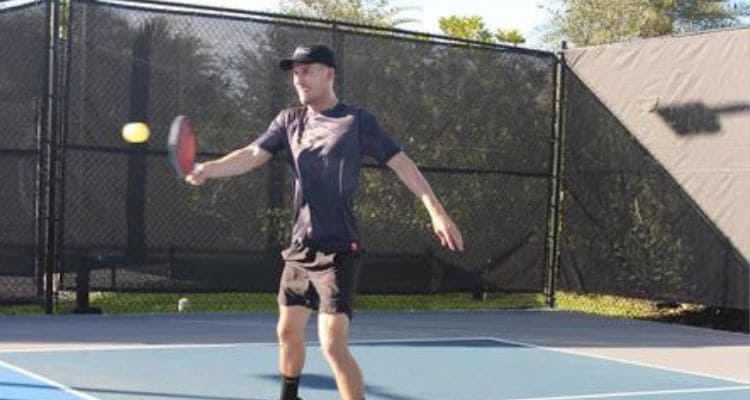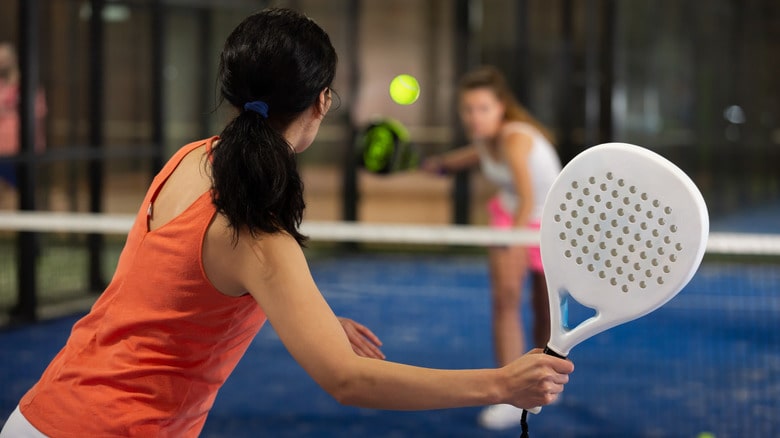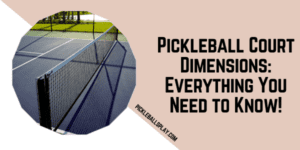Are you new to pickleball or looking to up your game? If so, then you’ve probably heard about the importance of the third shot. But what exactly is the pickleball 3rd shot, and why is it so crucial for your success on the court? Let’s dive in and explore!
What Is the 3rd Shot?
In pickleball, the third shot is the first shot taken by the serving team after the serve is returned. It’s called the third shot because it comes after the serve (1st shot) and the return of the serve (2nd shot). The third shot is a game-changer because it determines who will have the advantage in the rally.

The goal of the third shot is to neutralize the advantage of the receiving team by gaining control of the net. Receiving teams have an advantage because they can move up to the net after returning serves, while serving teams have to stay behind the baseline until the ball hits the non-volley zone (also known as the kitchen).
In both sides of the net, there’s a 7-foot non-volley zone where players can’t hit the ball in the air. When the serving team executes an excellent third shot, the receiving team is forced to back up from the net. This gives the serving team an opportunity to access the net themselves.
Types of 3rd Shots and When to Use Them
There are three main types of 3rd shots: drop, drive, and lob. Each type has its own advantages and disadvantages, and they require different skills and strategies. Let’s take a closer look at each one:
Drop Shot
A drop shot is a soft shot that lands close to the net in the non-volley zone. It’s considered the most effective 3rd shot because it makes it difficult for the receiving team to attack or volley. The drop shot also allows the serving team to move up to the net and establish a better position for the next shots.
However, executing a drop shot requires precise touch, timing, and placement. A poorly executed drop shot can be easily punished by the receiving team with a smash or a put-away. To hit a good drop shot, you need a relaxed grip, a low-to-high swing path, and a smooth follow-through.
Drive Shot
A drive shot is a hard shot that goes low over the net and deep into the opponent’s court. It surprises or pressures the receiving team with speed and power. The drive shot can also be used to set up a drop shot or a lob by changing the pace and direction of the ball.

However, the drive shot comes with some risks. It has less margin for error over the net and can easily go out. It can also be countered by the receiving team if they have good reflexes and anticipation. To hit a good drive shot, you need a firm grip, a flat swing path, and a compact follow-through.
Lob Shot
A lob shot is a high shot that goes over the opponent’s head and lands near the baseline. It catches the receiving team off guard or creates space and time for the serving team. It can also be used as a defensive shot when the serving team is in trouble or out of position.
However, the lob shot has its limitations. If the receiving team is alert with good footwork, they can easily intercept the lob shot. It can also be affected by the wind or the sun, causing it to go out or fall short. To hit a good lob shot, you need a soft grip, a high-to-low swing path, and a high follow-through.
Improving Your 3rd Shot Skills
If you want to improve your 3rd shot skills, there are several ways to practice and refine your technique. Here are three exercises you can try:
1. 3rd Shot Drop Drill
This drill focuses on improving your touch and accuracy with drop shots. You’ll need a partner or a ball machine to feed you balls from the opposite baseline. Start from the baseline and try to hit drop shots that land in the non-volley zone. Your partner or the ball machine will try to return your shots with volleys or dinks.
2. 3rd Shot Drive Drill
This drill helps you work on your power and control with drive shots. Again, you’ll need a partner or a ball machine to feed you balls from the opposite baseline. Start from the baseline and aim to hit drive shots that go low over the net and deep into the opponent’s court. Your partner or the ball machine will try to return your shots with volleys or dinks.
3. 3rd Shot Lob Drill
This drill focuses on timing and placement with lob shots. Use a partner or a ball machine to feed you balls from the opposite baseline. Start from the baseline and practice hitting lob shots that go over the opponent’s head and land near the baseline. Your partner or the ball machine will try to return your shots with smashes or overheads.
Remember to vary the speed, spin, height, angle, and direction of the balls you receive to make the drills more challenging and realistic.
Become a 3rd Shot Master!
By mastering the art of the 3rd shot, you can take your pickleball game to a whole new level. It’s all about gaining control of the net and neutralizing the receiving team’s advantage. So grab your paddle, practice those drop, drive, and lob shots, and get ready to dominate the court!

Frequently Asked Questions
How do I hit the 3rd shot in pickleball?
The third shot in pickleball is usually defensive. Ideally, you want to hit a challenging, low-bouncing dink (or short drop) close to the net that forces your opponents to hit up into your half of the court. Aim for spots that are difficult for your opponents to reach, and avoid being too predictable or making it easy for them to return.
Where should I aim my 3rd shot drop?
When executing a 3rd shot drop, aim for the middle of the court near the kitchen line. This keeps your opponents guessing and gives you more time to set up for a good return.
When should I not hit a 3rd shot drop?
There are a few situations where hitting a third shot drop may not be the best choice. If you’re close to the net and struggle to return your opponent’s reply, the risk of hitting a net shot or an out-of-bounds shot is too high. Additionally, if you’re running out of time, it might be better to skip the third shot drop and focus on returning your opponent’s reply quickly. Finally, if you’ve already hit two successful shots, it may be unnecessary to attempt the third shot drop and conserve your energy for the rally or point.
How can I keep the ball low in pickleball?
To keep the ball low in pickleball, use a shallow angle when you contact the ball and ensure your paddle is below waist level. Focus on striking near the edge of your paddle and use a light grip. Aim to create a low arc on your volley or serve, and use slow motion to reduce power.


